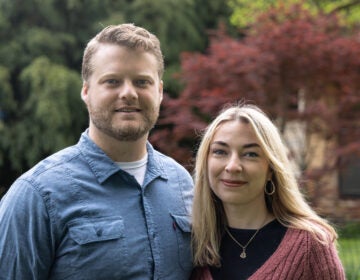Celebrating Women’s History Month with a look at ‘The Ladies of Laurel Hill’
More than a dozen history enthusiasts wandered through the Laurel Hill Cemetery on a recent Thursday evening to learn about the cemetery’s most accomplished ladies.
Ducking between gravestones, the group was led through a loop of the 15 “daring dames,” essentially untraditional women who broke through gender boundaries for the first time during the early 1900s. Among the lot included educators, authors, scientists, doctors and seamstresses alike. Though, all were women who married into wealth.
The East Falls cemetery spans 78 acres, and is the final resting place for many Philadelphia industrialists such as John Wharton, of the Wharton School of the University of Pennsylvania, but also little known scientists, such as Mary Engle Pennington.
Unearthing one woman’s story
Friends of Laurel Hill Cemetery’s board president Carol Yaster, a longtime professional flutist who had to quit after a battle with arthritis, offered the tour of notable women. She says Pennington defied the odds during her lifetime when she pushed to study science at a young age.
“They just laughed at her,” she said when young Pennington told her parents she wanted a Bachelors degree. Despite completing the coursework, Pennington received a mere “certificate of proficiency,” since Bachelors degrees were not typically awarded to women. But therein lay the problem because she couldn’t go for a PhD without a B.A. But again her willingness to go against the grain inspired professors at the university to allow her into the PhD program.
Among scientific circles, Pennington is known as the mother of refrigerated shipping, and the brains behind the egg carton.
“After 500 trips in a refrigerated box car, she discovered that you can’t just keep things cold, you also have to insulate and monitor humidity, and airflow,” said Yaster who began the women-centric tour after experiencing a tour at the cemetery in the early 1990s.
‘Classic Broads and Daring Dames’
“They handed me a map that had civil war generals on it, I looked at that and thought to myself, is that all that’s here? That’s not all that’s here,” she said, and so her research began.
“We have some high powered industrialists buried here, but their wives weren’t doormats, their wives were intelligent very resourceful women, who deserved to be remembered in their own right,” she says, though it was often difficult to track because most women took their husband’s surname after marriage.
One visitor, Tracy Kendig, an operations manager at the Eastern State Penitentiary, says she was interested in the event because she was tired of only hearing about men’s history.
“Tours usually focus on the guys with maybe one girl thrown in there, so I was excited for it to be all about women,” she said. “I liked that it was all about the stories behind what we were seeing, and not so much about the gravesites, or the cemetery itself, but the stories of the people that are here, so to speak,” she added.
The tour featured Sarah Josepha Hale, Esther de Berdt Reed, even Benjamin Franklins’ great granddaughter, Elizabeth Duane Gillespie, who led a women’s event during the 1876 Centennial Exposition in Phildelphia and pushed for women’s rights.
“Laurel Hill Cemetery is a place of life, its not a place of death–there are lots of dead people here but this is really a celebration of life,” added Yaster.
WHYY is your source for fact-based, in-depth journalism and information. As a nonprofit organization, we rely on financial support from readers like you. Please give today.










